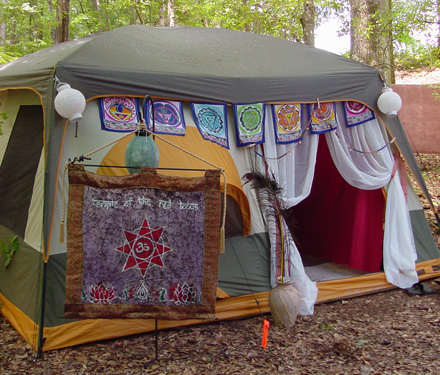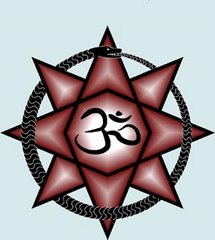Introducing Polyamory in an Academic Setting
by Inara de Luna (c) 2008
As some of you know, I'm pursuing a Master's degree from Capella University in Marital & Family Therapy. I had to make a decision early on regarding how out I wanted to be about my various fringe affiliations, but ultimately decided that since I want to be able to serve these populations, I wanted to be able to use and refer to them in my coursework when appropriate. The following is a recent essay I wrote for class, and the ensuing discussion between myself and two learners: one supportive, and one who had never heard the word, "polyamory."
~~~~~~~~
The American Counseling Association states in its ethical code that counselors are to engage in advocacy efforts at multiple levels in an effort to improve access to services and to improve the growth and development of their clients (A.6.a., 2005). Kiselica and Robinson (2001) explain that advocacy is intended to help increase their clients’ “sense of personal power and to foster sociopolitical changes that reflect greater responsiveness to the client’s personal needs” (p. 387). Advocacy is an important function and counselors are uniquely positioned to act as advocates, due to their direct clinical experience with clients who are the recipients and sometimes victims of injustices and imbalances in the greater society. Counselors can support their clients while also actively challenging the societal norms that may be impeding their clients’ wellbeing (Gladding, 2007).
Counselors have a responsibility to keep abreast of advocacy programs enacted by their professional associations, and to pay their dues to help support their professional associations so that those associations can continue their lobbying and other advocacy efforts. Because our clients are significantly impacted by community groups and organizations, it is the duty of the counselor to educate these groups and organizations about how they could better serve the people utilizing their services. In the past, counselors have presented to groups and organizations on the harmful effects of racism, and have advocated for understanding and support for lesbian, gay, and bisexual youth (Kiselica & Robinson, 2001). Some counselors have also started their own organizations to bring much needed services and changes to their communities that weren’t otherwise available, such as Parsons who founded Boston’s Vocational Bureau in 1908, to assist immigrant youth to find fulfilling work (Kiselica & Robinson, 2001).
Finally, counselors can work with political leaders to bring about much-needed social change, by writing letters and visiting with these persons, and through writing letters and articles for media, encouraging others to speak up (Gladding, 2007). Counselors have a responsibility to stay current on pending legislation that affects both their clients and the counseling profession, and to contribute their efforts to supporting or defeating bills, as appropriate. Research on troublesome social issues can also go a long way to improving those problems, both through public and political education about the reality of the issues and their effects on people.
Advocacy is exciting and inspiring and is a primary motivation for this learner to pursue this degree program. There are a number of misunderstood and underrepresented alternative relationship adherents who need advocacy in the social, political, and academic spheres. Those who practice polyamory, who are engaged in BDSM relationships, and those who practice paganism and other unconventional spiritual philosophies are not served well, if at all, by the current society, on any level, including the therapeutic profession. In order to assist these people to live fuller, healthier lives, a good deal of strong research and effective education needs to happen. This is what this learner is passionate about and motivated to change. As Kiselica and Robinson (2001) state,
Perhaps the most important step we all must take in advocacy work is to look deep within ourselves and try to discover what forms of human suffering really move us to the point that we want to get up and fight – each of us in our own unique way – for other human beings. (p. 395)
References:
American Counseling Association. (2005). Code of ethics. Codes of Ethics for the Helping Professions (3rd ed.). Belmont, CA: Thomson Brooks/Cole.
Gladding, S. T. (2007). Counseling: A comprehensive profession (5th ed.). Upper Saddle River, NJ: Pearson.
Kiselica, M. S., & Robinson, M. (2001, Fall). Bringing advocacy counseling to life: The history, issues, and human dramas of social justice work in counseling. Journal of Counseling & Development, 79. 387-397.
~~~~~~~~
Hello,
Your post was explosive! The statement, which really inspired me, is the fact that there are a number of "alternative relationship adhrents who need advocacy". This brings to mind the increased exposure of polygamists and those individuals seeking to escape their communities and traditional lifestyles. Surely this population will indeed require some form of counseling services in order to adjust to a "new" society. In any event, persons with your passion and drive are just the type MHC's society needs.
Great post!
F
---
Hi F!
Yes, the polygamists like Warren Jeffs and his family are an exception, in that they were so insulated from the outside world, and thus, wiill definitely need transition assistance.
However, sensationalized news stories about exaggeratedly unusual examples of "alternative relationship adherents" misleads people into thinking that everyone who believes in non-monogamy practices weird things like Jeffs, when that's simply not true. Part of my advocacy efforts is to help people understand that just because a family practices polyamory DOES NOT mean they believe in marrying 16 year old girls off to 50 year old men.
Thanks for the support and compliments! :)
--
First off for the record this learner believes in being married to only one person at a time and prefers no divorce. She has a friend who married a man from Ghana that was raised in a polygamist society. His father has 2 wives (I think that is the correct number and not 3) and a number of children. He described the way life was there and it is interesting how it is handled but still not for me. Luckily for my friend he does not believe in practicing that.
A number of other countries practice polygamy and even polyandry (one wife more then one husband). In some countries where there is a shortage of one sex it seems to meet a need and thus allowing more people to marry.
K
--
Hi K,
I respect your beliefs. Monogamy is a perfectly legitimate and fulfilling relationship style for some people. However, responsible non-monogamy can be an equally legitimate and fulfilling relationship style for others. Polyamory is the word that was coined to describe a responsible non-monogamous lifestyle to differentiate it from swinging and other forms of non-monogamy. Polyamory is more about the relationships, rather than the sex had in those relationships, and stresses openness, honesty, and communication between all involved.
Polyamory is also distinct from polygamy and polyandry because it doesn't limit the possibilities of loving relationship to the number of partners or their gender. It is also a relationship style that is not imposed on anyone - it involves a very conscious choice and relies on each individual's integrity to make it work.
There is a growing number of people practicing polyamory, including celebrities, and as more people begin to come out about this practice, we are likely to see them in our counseling offices. This is an area of diversity that hasn't gotten much attention yet, but it will.
Thank you for sharing your thoughts, and for being open to my response. If anyone is interested in more information on polyamory, I have a list of websites and journal articles that I can share.
--
Having no knowledge of anyone personally practicing this, this learner went to the web. Regardless of the fact that most people do not like it for a source she went to Wikipedia for quick information. This is the site looked at: http://en.wikipedia.org/wiki/Polyamory. She only read part of it as it is very long. If there is a better sight out there please post it. She knows this is not for her but she would like to read up more on it.
Thank you.
K
--
Hi K,
Thanks for asking! The wiki site does give a decent explanation of polyamory. I would also recommend you explore the following sites:
http://sexuality.about.com/od/alternativerelationships/a/psychologypoly.htm
http://www.ejhs.org/volume5/polyoutline.html
http://www.practicalpolyamory.com/
If you have specific questions, I'd be happy to take this discussion off-list and answer any of your questions via private email.
--
Will check out the sites later, when there is a spare moment. Polyamory was not a term this learner had remembered hearing about before. If she has questions after reading the sites she will get in contact. She would only be reading this for knowledge and incase the topic ever came up someone; ex. with a client or friend, she would be knowledgeable of the lifestyle. She does not believe that is the way to go and she is defiantly not looking to convert—she is very happy with the practice of monogamy. She wants to say thank you for daring to bring up an idea that is controversial to many, herself included.
K
--
Hi K,
I would never presume to suggest that anyone should convert. I offer the information to help promote awareness and to dispel myths and negative misconceptions. Polyamory is certainly not for everyone, just as pistachio pudding is not for everyone. :) You have my utmost respect, however, for being willing to learn about a practice that is so controversial and may be at odds with your own personal beliefs and values.
Temple of the Red Lotus Vending Tent

See us at pagan festivals in the SouthEast!
Tuesday, April 15, 2008
Subscribe to:
Post Comments (Atom)



3 comments:
My husband and I were talking about this topic in a broad sense the other day, and he thought that it would probably be better to use the term "non-monogamy" than "polyamory" when discussing this group of practices. As you saw, many people will confuse "polyamory" with "polygamy." This does not seem like a good conflation, given the frequently coercive practices of polygamy.
Even though "non-mongamy" is a term that describes by negative, i.e., what it's not, I personally feel it's a much better descriptive word that encompasses many practices. And distancing from polygamy as much as possible can only be a good thing.
Hi epiphany!
Thanks for your comment. You're right, that "polyamory" doesn't always adequately convey or include all the forms of non-monogamy that are practiced. "Responsible non-monogamy" is the term many people prefer. Morning Glory Zell coined "polyamory" to be a more elegant and easier-to-say way to discuss responsible non-monogamy, but there are still issues with it. I choose to use the term "polyamory" as that is the one that is becoming more widely recognized and utilized, and because I don't really like defining things by what they are not. Saying "non-monogamy" draws one's attention to the norm, and in my opinion, closes off avenues of understanding...whereas saying "polyamory" often gets a confused look and gives the speaker the chance to define it in a positive light. This is similar to my reasons for using the word "qadishtu" as opposed to "sacred prostitute". :)
Kudos on the academic courage you showed in this exchange! It looks like a great educational opportunity.
Hi, I've just subscribed to your blog after my honey passed along your recent post on sex-positivity and sacred sexuality. Our blog is over at pornocracy.org.
Post a Comment